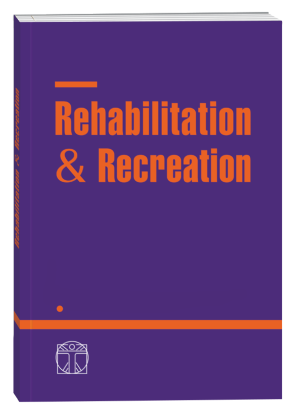ANALYSIS OF THE APPLICATION OF THE PEDI CHILD DISABILITY QUESTIONNAIRE IN THE PROCESS OF PHYSICAL THERAPY
DOI:
https://doi.org/10.32782/2522-1795.2023.17.11Keywords:
rehabilitation assessment, questionnaire, functioning, psychometric properties, rehabilitation.Abstract
Objective is to analyze the effectiveness of using the PEDI Pediatric Evaluation of Disability Inventory during the rehabilitation assessment of pediatric patients of non-ecological etiology. Material and methods: systematic approach, generalization, induction, analysis and synthesis, measurement, mathematical linear econometric model, multiple regression. Results. Since children who need palliative non-oncological care have multifaceted pathological symptoms, PEDI can identify problems that limit the child's daily activities – self-care, mobility, social functioning. The study involved 47 children in need of palliative non-oncological care, who were divided into the main group (24 children) and the comparison group (23 children). At the end of the rehabilitation course, a follow-up evaluation of the PEDI domains showed a qualitative improvement in the children of both groups. In the Mobility domain, the indicator of the probability of discrepancy p < 0.05 was found in three categories in the children of the main group, in two categories in the children of the comparison group; in the domain of Social functioning, the indicator of probability of discrepancy p < 0.05 was observed in eleven categories in the main group, and in five categories in the comparison group; in the Self-service domain, the indicator of the probability of discrepancy p < 0.05 was estimated in fourteen categories, in the comparison group – in seven categories. In the course of the study, a correlation between the scales of the PEDI questionnaire was confirmed using multiple regression (correlation coefficient 0,89614649). Using a linear econometric model, a correlation was established between the PEDI scale Social functioning, expressed in points, and the possibility of Communication (correlation coefficient 0,916596) and Participation in the case (correlation coefficient 0,802483), expressed using the ICF qualifier (correlation coefficient 0,802483). A correlation was also found between the PEDI Self-Care scale, the level of MACS hand development, and Control of voluntary motor functions (correlation coefficient 0,850873). Conclusions. The PEDI is an objective means of assessing the current level of function, personality development of the pediatric patient, and examining functional outcomes over a period of time.
References
Григус І.М., Нагорна О.Б. (2023). Метод танцювально-рухової терапії дітей, які потребують паліативної допомоги. Rehabilitation &
recreation. 14:27-36. https://doi.org/10.32782/2522-1795.2023.14.3
Загальна інвалідність дітей 0–17 років в Україні у 2015–2022 роках (аналітично-статистичний довідник). (2022). Київ. http://medstat.gov.ua/ukr/MMXXI.html
Закон України «Про освіту». https://urst.com.ua/act/pro_osvitu
Закон України «Про реабілітацію осіб з інвалідністю в Україні». https://zakon.rada.gov.ua/laws/show/2961-15#Text
Колонюк К.О. (2023). Огляд сучасних інструментів оцінки ходи при обстеженні дітей із церебральним паралічем. Молодий вчений. 1(113):28-34. https://doi.org/10.32839/2304-5809/2023-1-113-7
Наказ Міністерства охорони здоров’я «Про удосконалення організації надання паліативної допомоги в Україні». (2020). https://zakon.rada.gov.ua/laws/show/z0609-20#Text
Питальник оцінки дитячої інвалідності PEDI. https://kozyavkin.com/uk/news/content/pitalnik-ocinki-ditjachoji-invalidnosti-pedi/
Смертність дітей у віці до 1 року за причинами смерті в Україні у 2010–2022 роках (аналітично-статистичний довідник). (2022).
http://medstat.gov.ua/ukr/MMXXI.html
Grygus I., Nagorna O., Nesterchuk N., Nogas A., Podoliaka P., Gamma T. (2021). A clinical case of physical therapy of a child with multiple sulfatase deficiency. Med. perspekt. 26(2):202-7. https://doi.org/10.26641/2307-0404.2021.2.234735
Kramer J.M., Liljenquist K., Coster W.J. (2016). Validity, reliability, and usability of the Pediatric Evaluation of Disability Inventory‐
Computer Adaptive Test for autism spectrum disorders. Developmental Medicine & Child Neurology. 58(3):255-61.3 DOI: 10.1111/dmcn.
Paediatric Evaluation of Disability Inventory – Computer Adaptive Test (PEDI – CAT). https://movingahead.psy.unsw.edu.au
Shore B.J., Allar B.G., Miller P.E., Matheney T.H., Snyder B.D., Fragala-Pinkham M.A. (2017). Evaluating the discriminant validity of the pediatric evaluation of disability inventory: computer adaptive test in children with cerebral palsy. Physical therapy. 97(6):669-676.1
DOI: 10.1093/ptj/pzx033
Downloads
Published
How to Cite
Issue
Section
License

This work is licensed under a Creative Commons Attribution-NonCommercial-NoDerivatives 4.0 International License.











